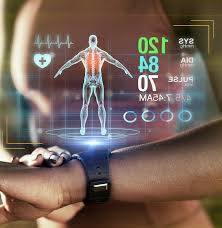Wearable Health Tech: Keeping Track of Your Health 24/7
Imagine having a tiny helper that watches over your health all day and night. That's what wearable health technology does. These are gadgets you can wear, like bracelets or watches, that keep an eye on how your body is doing. They help you and your doctor understand your health better.
What Are Wearable Health Devices?
Wearable health devices are small tools you wear on your body. They can look like regular accessories, such as watches or bands, but they have special sensors inside. These sensors check things like your heart rate, how many steps you take, how well you sleep, and even your stress levels. Some advanced ones can monitor your blood sugar or detect irregular heart rhythms.
How Do They Work?
These devices have tiny computers and sensors that collect information from your body. For example, a sensor touching your skin can feel your pulse to measure your heart rate. They use Bluetooth to send this information to an app on your smartphone, where you can see your health data displayed in easy-to-understand charts and graphs.
Why Are They Useful?
- Continuous Monitoring: Unlike a single doctor's visit, these devices watch your health all the time. This means they can spot changes early, which is important for catching potential health issues before they become serious.
- Personalized Insights: By collecting data specific to you, they help create a picture of your unique health patterns. This personalized information can guide lifestyle choices and treatments tailored just for you.
- Encouraging Healthy Habits: Seeing real-time data about your activity levels or sleep patterns can motivate you to make healthier choices, like moving more or getting enough rest.
Examples of Wearable Health Devices
- Fitness Trackers: Devices like Fitbit or Garmin track your daily steps, exercise, and sleep quality.
- Smartwatches: Apple Watch and similar gadgets not only tell time but also monitor your heart rate, detect falls, and can even perform electrocardiograms (ECGs).
- Continuous Glucose Monitors (CGMs): For people with diabetes, devices like the Dexcom G6 monitor blood sugar levels throughout the day and night, helping manage the condition more effectively.
- Wearable ECG Monitors: These devices continuously track heart rhythms and can detect irregularities, which is crucial for individuals with heart conditions.
Recent Innovations
- Perimenopause Monitoring: At CES 2025, a new device called Peri was introduced. It's designed to help women going through perimenopause by tracking symptoms like hot flashes and mood changes, providing insights to manage this life stage better.
- Advanced Health Metrics: Companies are developing devices that monitor a wide range of health indicators, from arterial health to hormone levels, offering more comprehensive health monitoring solutions.
Challenges and Considerations
While wearable health tech offers many benefits, there are some things to keep in mind:
- Data Privacy: These devices collect personal health information, so it's important to ensure your data is protected and shared only with your consent.
- Accuracy: While technology is improving, some devices may not always provide perfectly accurate readings. It's best to use them as a guide and consult with healthcare professionals for medical advice.
- Over-Reliance: While helpful, these gadgets shouldn't replace regular medical check-ups. They are tools to assist you but not substitutes for professional healthcare.
The Future of Wearable Health Tech
As technology advances, wearable health devices are becoming more sophisticated. Future devices may be able to monitor a wider range of health metrics, provide more accurate data, and integrate seamlessly into our daily lives. This continuous monitoring can lead to earlier detection of health issues, personalized treatment plans, and overall better health management.
Wearable health technology is like having a personal health assistant with you at all times. By keeping track of your body's signals, these devices empower you to take charge of your health, make informed decisions, and live a healthier life. As with any tool, it's important to use them wisely, understand their capabilities and limitations, and continue regular consultations with healthcare professionals.


